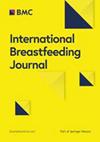The importance of community resources for breastfeeding
IF 2.9
2区 医学
Q1 OBSTETRICS & GYNECOLOGY
引用次数: 0
Abstract
Breastfeeding has long-lasting effects on children’s cognition, behavioral, mental and physical health. Previous research shows parental characteristics (e.g., education, race/ethnicity, income level) are associated with breastfeeding initiation and duration. Further, research shows significant variation in access to community resources by race/ethnicity. It is unclear how community resources may impact breastfeeding practices and how this might intersect with maternal race/ethnicity. This study combined nationally-representative data from the Study of Attitudes and Factors Effecting Infant Care (SAFE), which surveyed US mothers immediately after the infant’s birth and at two to six months of infant age, with the Child Opportunity Index (COI) 2.0, a census tract measure of community resources associated with child development, to explore the association between community resources and breastfeeding initiation and whether this varies based on maternal race/ethnicity and country of birth. The SAFE Study used a stratified, two-stage, clustered design to obtain a nationally representative sample of mothers of infants, while oversampling Hispanic and non-Hispanic (NH) Black mothers. The SAFE study enrolled mothers who spoke English or Spanish across 32 US birth hospitals between January 2011 and March 2014. After accounting for individual characteristics, mothers residing in the highest-resourced communities (compared to the lowest) had significantly greater likelihood of breastfeeding. Representation in higher-resourced communities differed by race/ethnicity. Race/ethnicity did not significantly moderate the association between community resources and breastfeeding. In examining within race/ethnic groups, however, community resources were not associated with non-US born Black and Hispanic mothers’ rates of breastfeeding, while they were with US born Black and Hispanic mothers. Findings suggest that even health behaviors like breastfeeding, which we often associate with individual choice, are connected to the community resources within which they are made. Study implications point to the importance of considering the impact of the contextual factors that shape health and as a potential contributor to understanding the observed race/ethnicity gap.社区资源对母乳喂养的重要性
母乳喂养对儿童的认知、行为、心理和身体健康有着长期的影响。以往的研究表明,父母的特征(如教育、种族/民族、收入水平)与母乳喂养的开始和持续时间有关。此外,研究还表明,不同种族/族裔在获取社区资源方面存在很大差异。目前还不清楚社区资源如何影响母乳喂养的实践,以及这种影响如何与产妇的种族/民族相交织。这项研究将 "影响婴儿护理的态度和因素研究"(SAFE)中具有全国代表性的数据与 "儿童机会指数"(COI)2.0(一种与儿童发展相关的社区资源普查区测量方法)相结合,以探讨社区资源与母乳喂养启动之间的关联,以及这种关联是否会因母亲的种族/民族和出生国而有所不同。SAFE 研究采用了分层、两阶段、聚类设计,以获得具有全国代表性的婴儿母亲样本,同时对西班牙裔和非西班牙裔(NH)黑人母亲进行超量抽样。SAFE研究在2011年1月至2014年3月期间对美国32家分娩医院中讲英语或西班牙语的母亲进行了登记。在考虑了个人特征后,居住在资源最丰富社区的母亲(与资源最匮乏社区的母亲相比)母乳喂养的可能性要大得多。不同种族/族裔的母亲在资源丰富的社区中的比例也不同。种族/人种并没有明显缓和社区资源与母乳喂养之间的关系。然而,在种族/族裔群体内部进行研究时,社区资源与非美国出生的黑人和西班牙裔母亲的母乳喂养率无关,而与美国出生的黑人和西班牙裔母亲有关。研究结果表明,即使是像母乳喂养这样我们通常认为是个人选择的健康行为,也与社区资源有关。研究意义表明,考虑影响健康的环境因素的影响非常重要,这也是理解所观察到的种族/族裔差距的潜在因素。
本文章由计算机程序翻译,如有差异,请以英文原文为准。
求助全文
约1分钟内获得全文
求助全文
来源期刊

International Breastfeeding Journal
Medicine-Obstetrics and Gynecology
CiteScore
6.30
自引率
11.40%
发文量
76
审稿时长
32 weeks
期刊介绍:
Breastfeeding is recognized as an important public health issue with enormous social and economic implications. Infants who do not receive breast milk are likely to experience poorer health outcomes than breastfed infants; mothers who do not breastfeed increase their own health risks.
Publications on the topic of breastfeeding are wide ranging. Articles about breastfeeding are currently published journals focused on nursing, midwifery, paediatric, obstetric, family medicine, public health, immunology, physiology, sociology and many other topics. In addition, electronic publishing allows fast publication time for authors and Open Access ensures the journal is easily accessible to readers.
 求助内容:
求助内容: 应助结果提醒方式:
应助结果提醒方式:


